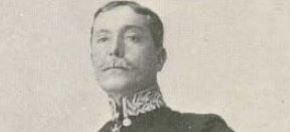

The Bleck family has made significant contributions to life in Portugal and the Bleck name is to be found in many walks of life. Unlike some British families in Portugal, who have retained their British nationality, the Blecks are now all Portuguese, so it is perhaps not widely known that the original Bleck arrived here from England.
Joseph William Henry Bleck (pictured) was born in Malta in 1854. One source suggests that he came from a Polish Jewish family. By the time of the 1881 British census, he was living in Fulham, together with his wife, Sofia, and two children. He was already active in Portugal, having in 1878 received a concession to build and operate a railway from Lagos to Vila Real de Santo António in the Algarve. This project never came to fruition.
In 1910, Bleck, having seen the beginnings of the oil industry in England, registered “The Lisbon Coal and Oil Fuel Company Limited”, to act as an agent in Portugal for the Shell Company. Initially establishing facilities in Arealva on the south bank of the Tagus, he then acquired land at Banática, further to the west, where he constructed warehouses; oil at the time being shipped in drums. The first ship docked there in August 1916. Bleck’s other business interests included a partnership with Jorge O’Neill and the Companhia Portugueza de Phosphoros that produced matches. He became president of the British Chamber of Commerce in Lisbon and was Consul-General for Greece in Portugal. Bleck died in 1918 at his home in Dafundo, close to Cruz Quebrada, where there is a street named after him.
Bleck’s second daughter, Edith, married into the Lancastre family, with her husband, the second Count of Lousã, also becoming a partner with Jorge O’Neill. Charles Henry, the eldest son, took over the family business, while the two younger sons, William, serving as an interpreter with the French, and George, distinguished themselves in the British army in WWI.
Charles opened an office for the Lisbon Coal and Oil Fuel Company in Rua de São Julião in the centre of Lisbon in 1919 in order to receive orders and expanded distribution through agents throughout the country by train and ship, including the Azores, Madeira and Cabo Verde. At the beginning of 1923, overwhelmed by other business activities, he left the management of the company, to be replaced by Tyrell Michael Shervington, who was killed in the plane crash that killed the actor Leslie Howard in 1943.
Charles was well-known for his sporting activities, which included equestrianism, fencing, hunting, rowing, cycling, motor racing, and aviation. Bleck was also a keen sailor. He regularly competed against the King’s yacht and also won regattas in France. He was commodore of the Club Naval de Lisboa (1911) and of the Lisbon Naval Association (1914). In 1912, he was a founding vice-president of the Portuguese Olympic Committee, which was set up by some private individuals, given the lack of interest on the part of the government. He is said to have spent his own money to ensure Portuguese participation at the Games. During WWI he carried out several important missions for both Portuguese and British governments, carrying secret documents between the two countries. The former home of Ricardo Espírito Santo near Boca do Inferno in Cascais, which hosted the Duke and Duchess of Windsor in 1940, was originally built for Bleck. Charles Bleck died in Sintra in 1934.
Carlos Eduardo Bleck was the first son of Charles and his first wife, Helena Pedroso dos Santos. Following in his father’s footsteps he was an active sportsman, representing Portugal in the 1928 Olympics, where he finished 12th in the six-metre sailing class. But he was best-known as an aviator, being the first Portuguese to have a civil pilot's licence and making the first solo flight from Portugal to India (Goa) in 1934 and from Portugal to Angola and back with a co-pilot in 1930. Bleck founded the Companhia de Transportes Aéreos (CTA) in 1945, offering scheduled flights between Lisbon and Porto as well as charter flights, with a fleet of six planes. With the establishment of TAP as a state monopoly in 1945, and that airline’s opening of Lisbon-Porto services in 1947, Bleck concentrated on charter flights, but closed the company down in 1949. He was a member of the TAP board. A supporter of the Estado Novo, he had an unfortunate accident in a plane called Salazar. Bleck died in 1975.
SUBSCRIBE TO OUR NEWSLETTER